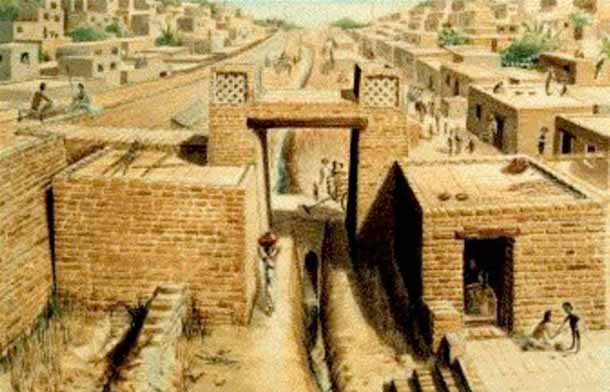INDUS VALLEY

INTRODUCTION
Card game for 2-7 players.
Each player represents a city of the Bronze Age Indus Valley Civilization (IVC).
Also known as the Harappan Culture.
GAME END
The game ends after 10 turns.
Each turn represents 200 years.
The IVC flourished (present day Pakistan) 3300 - 1300 BCE.
VICTORY
At the end of the game each player looks at his 7 point categories.
A players final score is equal to his score in his lowest scoring category.
The player with the highest Final Score Wins.
POINT CATEGORIES
Players accumulate points in 7 Point (Scoring) Categories:
1. Farming
2. Animals
3. Materials
4. Products
5. Trade
6. Building
7. Culture
Players use paper and pencil to keep track of their scores.
THE DECK
Players share a common deck.
Each card has the trait of one or more scoring categories.
CITIES
Before play each player picks one of the following Cities as their own:
# City: Special Ability:
1. Harappa Draw 1 extra card per turn in Draw phase
2. Mohenjo Daro Hand size +2
3. Lothal All Melds score +3 points
4. Dholavira Draw 1 card every time you make a Meld
5. Ganweriwala Starts game with 7 points in every Category
6. Kalibanga May make melds of just 2 cards each
7. Rakhigarhi Can use Culture cards as wild cards
TURN SEQUENCE
Each turn has 4 Phases:
1. Draw Phase
2. Trade Phase
3. Meld Phase
4. End Phase
DRAW PHASE
Each player draws 3 cards OR fills their hand to 7 cards.
If the deck runs out, shuffle the discard and draw from it.
TRADE PHASE
Players may trade Cards and Points with each other.
Trades do not have to be equal.
Players should keep their point totals secret, however they can
trade points. Players are of course on the honor system.
Limit this phase to 5 minutes.
MELD PHASE
Each player may make 1 or more melds in this phase.
A Meld must consist of 3 or more cards in the same Category.
A Meld score points in that category equal to the Square of the number of
cards in the meld. For example: A Meld of 5 Farming cards would earn
25 points in the Farming category score.
END PHASE
Max hand size is 5.
Discard excess cards.
CARD LIST NOTATION
F = Farming
A = Animals
M = Materials
P = Products
T = Trade
B = Building
C = Culture
COMMON DECK CARD LIST
Name: Type:
Agriculture F
Pottery P
Trade Network T
Great Bath B
Citadel B
Multistory Houses B
Merchants T
Grain F
Gold Jewelry P
Cloth P
Precious Metals M
Metallurgy M
Handicraft P
Copper M
Lead M
Tin M
Lapis Lazuli M
Urban Culture C
Religious Ritual C
Municipal Government C
Urban Planning C
Wells B
Sanitation System B
Engineering C or B
Granaries B or F
Courtyards B
Flood Control C
Burials C
Proto-Hinduism C
Harbors T or B
Maritime Trade T
Ornaments P
Caravans T or A
Dredged Canals T or B
Sail Boats T
Bread F
Rice F
Flint M
Tools P
Barley F
Peas F
Wheat F
Adobe Bricks M or B
Sheep A
Goats A
Cows A
Water Buffalo A
Beads P
Shell Buttons P
Bronze M
Metals M
Shops T
Grand Marketplace T
Mustard F
Script C
Fishing A
Melons F
Ploughs F or A
Bullock Carts T or A
Cremation Urns C
Musical Instruments C or P
Agate M
Ceramics P
Dance C
Furnaces C
Jungle Hunting A or C
Ivory P or A
Zebu Cattle A
Terracotta Figurines P
Metal Statues P
Dentistry C
Covered Drains B
Weights & Measures C
Arithmetic C
Sesame Seeds F
Dates F
Cotton P or F
Chickens A
Dogs A
Cats A
Camels A
Pigs A
Elephants A
Architecture C or B
City Walls B
Dockyards T or B
Warehouses T or B
Steatite Seals T or P
LINKS
IVC
wikipedia
Harappa


Return to Warpspawn Mainpage


